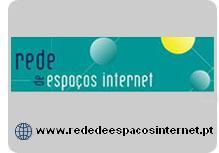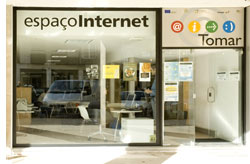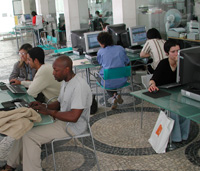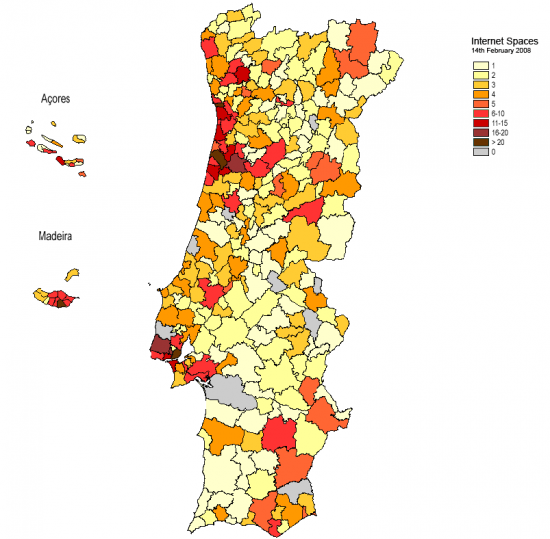

 Inclusion and Accessibility
Inclusion and Accessibility  Projects
Projects  Internet Spaces Network
Internet Spaces Network Internet Spaces Network
The Internet Spaces are places of free public access which make regular use of computers and the Internet available as well as providing support staff (monitors) to help people use these technologies. Many of these spaces meet accessibility criteria for citizens with special needs.
 In order to make full use of this powerful means of promoting inclusion and ICT penetration, Knowledge Society Agency (UMIC) promoted the organisation of the Internet Spaces Network, and marked its beginning through holding the Internet Spaces Network Meeting in November 2006, and it has now integrated the current set of 1,172 Internet Spaces into an organised community functioning effectively up and down the Country in varying formats:
In order to make full use of this powerful means of promoting inclusion and ICT penetration, Knowledge Society Agency (UMIC) promoted the organisation of the Internet Spaces Network, and marked its beginning through holding the Internet Spaces Network Meeting in November 2006, and it has now integrated the current set of 1,172 Internet Spaces into an organised community functioning effectively up and down the Country in varying formats:
- 329 Internet spaces set up with specific public hardware in municipalities – In July 2005 there were 257, which had been set up between 1999 and 2003 with the support of the Operational Programme for the Information/Knowledge Society (POSI/POSC) with the Connecting Portugal programme aiming to double the number of these spaces. These were the first to be set up and the name “Internet Spaces" was commonly used to refer to these spaces.
- 251 in Welfare Institutions – mostly set up with the support of the POSI/POSC programme under the scope of the Solidarity Click initiative.
- 187 in Public Libraries – Most of which were set up with financing from POSI/POSC under the scope of a protocol entered into between Knowledge Society Agency (UMIC) and the National Association of Portuguese Municipalities.
- 132 in Digital Inclusion Centres – Set up with the support of POSI/POSC under the scope of the Choices Program (site in Portuguese).
- 123 in Digital Cities and Digital Regions – Set up under the scope of the Digital Cities and Digital Regions projects supported by POSI/ POSC.
- 30 in Employment and Training Centres – Financed by POSI/POSC under the scope of a project run by the Institute for Employment and Vocational Training (IEFP).
- 55 in Cultural, Recreational and Sports Collectives – Set up with the support of POSI/POSC, most of them within the scope of the Madeira Technopolis – Scientific and Technological Centre for Madeira project and the 2001 Associations project.
- 54 Internet Clubs – Set up with the support of POSI/POSC for the Information Solidarity Network of the Azores – RSIA.
- 11 Internet Spaces in “Ciência Viva” Centres – Set up as "Ciência Viva" Centres.
Map showing the location of Internet Spaces per district
The first Internet Spaces were set up in Portugal in 1998-99 under the scope of the Digital Cities pilot projects with financing from the Telecommunications Operational Intervention (IOT) agency through the Science and Technology Foundation (FCT). From 2000 onwards, POSI – The Operational Programme for the Information Society – supported the setting up of Internet Spaces specifically with public resources and equipment made available in local councils, through a protocol entered into with the National Association of Portuguese Municipalities. Within this project 257 Internet Spaces were set up between 2000 and 2003. This number remained the same until July 2005 when the programme Connecting Portugal envisaged the number doubling by 2010. In November 2007 the number of these spaces had reached 294.
Means of access to the Internet were set up in public libraries, most of which involving financing from POSI/POSC under the scope of a protocol entered into between UMIC and the National Association of Portuguese Municipalities. In 187 of these libraries, these resources were organised in a similar manner to Internet Spaces and, in some cases, comprised spaces on a large-scale in terms of the numbers of computers made available.

A further 215 Internet Spaces in selected Private Social Solidarity Institutions (ISS) were set up with financing from POSI/POSC, based on the recognition of work to fight poverty and social exclusion, under the scope of the “Clique Solidário” Programme which was approved in March 2002 in a programme-contract signed between POSI and ISSS - Institute for Solidarity and Social Security (site in Portuguese).
Some of the Digital Cities and Digital Regions projects financed by POSI/POSC set up Internet Spaces directly (123), and in particular the Aveiro Digital (site in Portuguese) project, where 98 were set up. The other 24 were set up as part of the Beja Digital (site in Portuguese), Ribatejo Digital (site in Portuguese), Oeste Digital (site in Portuguese), Almada Digital (site in Portuguese), Gaia Global (site in Portuguese), Coimbra Região Digital (site in Portuguese), Trás-os-Montes Digital (site in Portuguese), Entre Douro e Vouga Digital (site in Portuguese), Madeira Digital (site in Portuguese) and Porto Digital (site in Portuguese) projects.
132 Internet Spaces were set up in Digital Inclusion Spaces as part of the Choices Program (site in Portuguese) with the financial support of POSI/POSC. This programme was set up in January 2001 and its first stage, which lasted until December 2003, was oriented towards the prevention of crime and the social inclusion of young people from the most problematic quarters of Lisbon, Oporto and Setúbal. The second stage of the programme – Choices Program 2nd Generation – was started in 2004 and its priority target audience became children and young people aged between 6 and 18 who came from less well-off and problematic socio-economic contexts, and in particular descendents of immigrants and ethnic minorities, and also including young people between 19 and 25, families and other community elements, such as teachers, educational support staff, etc. The programme also changed from being a centralised organisation to becoming one based on projects planned by local institutions (Schools, Training Centres, Associations, Social Welfare Organisations) selected through evaluating proposals submitted. The 2nd Generation Choices Program was divided into four areas, one of which was Digital Inclusion through the setting up of Digital Inclusion Centres. This involved 87 projects located in the North (33), Centre (29) and the South and the Islands (25) Areas, which together involved 412 local institutions and 394 full time technicians serving around 18,000 children and young people. The Choices Program (site in Portuguese) - 3rd Stage was approved for the 2007 – 2009 period, and was strengthened through an increase in investment and the number of projects to be supported, which totalled 121 serving 48,100 children and young people.
POSI/POSC also financially supported the project of the 2001 Associations of the Portuguese Federation of Cultural, Recreational and Sports Collectives (site in Portuguese), which involved making Internet access points available in 66 collectives, some of which were set up in a similar manner to the Internet Spaces by offering the help of trained personnel, as well as having a sufficient number of computers and being open to the general public.

Internet Spaces in “Ciência Viva” Centres were also set up. “Ciência Viva” Centres are interactive spaces to disseminate scientific and technical knowledge and are to found throughout Portugal. They function as scientific, cultural and economic regional development platforms - through the dynamising of those who are more active in these areas in each region. The “Ciência Viva” Centres Network is coordinated by the Knowledge Pavillion, where the Ciência Viva – the National Agency for Scientific and Technological Culture project has its headquarters, and this body has 16 centres, including the Pavilion of Knowledge (Pavilhão do Conhecimento) itself, which houses one of the first Internet Spaces to be set up in the country: the cib@rcafé.
The organisation of Internet Spaces Network has the following objectives:
- Establishing a national collaborative framework for Internet Spaces;
- Jointly promoting the use of ICT and social inclusion activities;
- Fostering exchange of best practices and disseminating initiatives;
- Maximising the integrated contribution of the various individuals and entities involved and their drive to develop and take the fullest advantages possible of the powerful instrument for inclusion which this network offers given its dimension and penetration within Portuguese territory.


